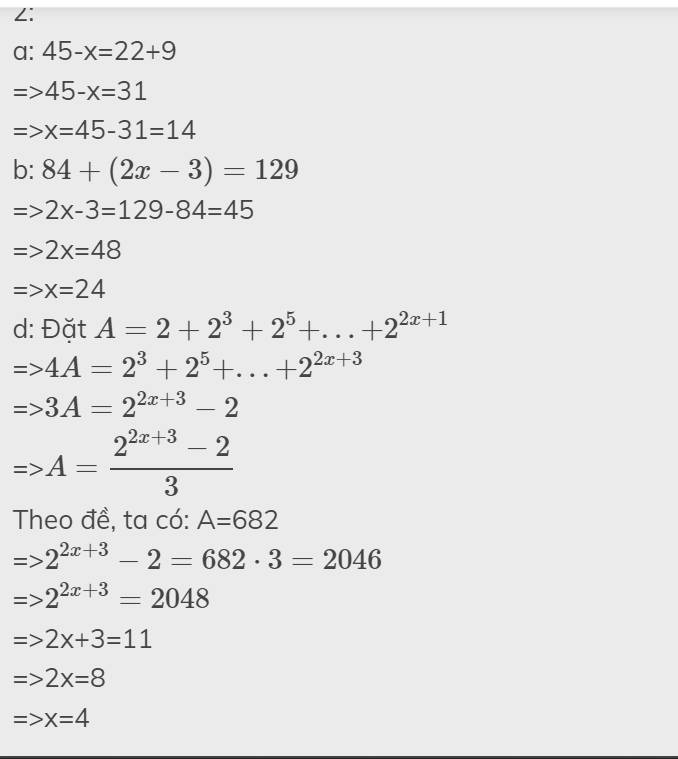Tìm x biết
a)\(3^{x-1}=\frac{1}{243}\)
b)\(2^x+2^{x+3}=114\)
Hãy nhập câu hỏi của bạn vào đây, nếu là tài khoản VIP, bạn sẽ được ưu tiên trả lời.



2:
a: \(126⋮x;144⋮x\)
=>x thuộc ƯC(126;144)
mà x lớn nhất
nên x=UCLN(126;144)=18
b: 121 chia x dư 1
=>121-1 chia hết cho x
=>120 chia hết cho x(1)
183 chia x dư 3
=>183-3 chia hết cho 3
=>180 chia hết cho x(2)
Từ (1), (2) suy ra \(x\inƯC\left(120;180\right)\)
mà x lớn nhất
nên x=ƯCLN(120;180)=60
c: 240 và 384 đều chia hết cho x
=>\(x\inƯC\left(240;384\right)\)
=>\(x\inƯ\left(48\right)\)
mà x>6
nên \(x\in\left\{8;12;16;24;48\right\}\)

Bài 1:
a) Ta có: \(\dfrac{17}{6}-x\left(x-\dfrac{7}{6}\right)=\dfrac{7}{4}\)
\(\Leftrightarrow\dfrac{17}{6}-x^2+\dfrac{7}{6}x-\dfrac{7}{4}=0\)
\(\Leftrightarrow-x^2+\dfrac{7}{6}x+\dfrac{13}{12}=0\)
\(\Leftrightarrow-12x^2+14x+13=0\)
\(\Delta=14^2-4\cdot\left(-12\right)\cdot13=196+624=820\)
Vì Δ>0 nên phương trình có hai nghiệm phân biệt là:
\(\left\{{}\begin{matrix}x_1=\dfrac{14-2\sqrt{205}}{-24}=\dfrac{-7+\sqrt{205}}{12}\\x_2=\dfrac{14+2\sqrt{2015}}{-24}=\dfrac{-7-\sqrt{205}}{12}\end{matrix}\right.\)
b) Ta có: \(\dfrac{3}{35}-\left(\dfrac{3}{5}-x\right)=\dfrac{2}{7}\)
\(\Leftrightarrow\dfrac{3}{5}-x=\dfrac{3}{35}-\dfrac{10}{35}=\dfrac{-7}{35}=\dfrac{-1}{5}\)
hay \(x=\dfrac{3}{5}-\dfrac{-1}{5}=\dfrac{3}{5}+\dfrac{1}{5}=\dfrac{4}{5}\)

b) \(x^3-x^2-x+1=0\Leftrightarrow\left(x-1\right)^2\left(x+1\right)=0\)
\(\Leftrightarrow x-1=0\) hoặc \(x+1=0\)
\(\Leftrightarrow x=1\) hoặc \(x=-1\)
c) \(x^2-6x+8=0\Leftrightarrow\left(x-4\right)\left(x-2\right)=0\)
\(\Leftrightarrow\left[{}\begin{matrix}x-4=0\\x-2=0\end{matrix}\right.\Leftrightarrow\left[{}\begin{matrix}x=4\\x=2\end{matrix}\right.\)
a) \(x^3+x^2+x+1=0\Leftrightarrow\left(x+1\right)\left(x^2+1\right)=0\Leftrightarrow x+1=0\Leftrightarrow x=-1\)
(do \(x^2+1\ge1>0\))

\(\left(-\dfrac{3}{4}x+1\right)\div\dfrac{2}{3}=1\)
\(-\dfrac{3}{4}x+1=1\times\dfrac{2}{3}\)
\(-\dfrac{3}{4}x+1=\dfrac{2}{3}\)
\(-\dfrac{3}{4}x=\dfrac{2}{3}-1\)
\(-\dfrac{3}{4}x=-\dfrac{1}{3}\)
\(x=-\dfrac{1}{3}\div\left(-\dfrac{3}{4}\right)\)
\(x=\dfrac{4}{9}\)
x+3=6
x=6-3
x=3

a: Ta có: \(\left(2x+1\right)^2-4\left(x+2\right)^2=9\)
\(\Leftrightarrow4x^2+4x+1-4x^2-16x-16=9\)
\(\Leftrightarrow-12x=24\)
hay x=-2
b: Ta có: \(\left(x+3\right)^2-\left(x-4\right)\left(x+8\right)=1\)
\(\Leftrightarrow x^2+6x+9-x^2-4x+32=1\)
\(\Leftrightarrow2x=-40\)
hay x=-20

`#3107.101107`
`1.`
`a,`
`(2x - 3)^2 = |3 - 2x|`
`=> (2x - 3)^2 = |2x - 3|`
`=>`\(\left[{}\begin{matrix}2x-3=\left(2x-3\right)^2\\2x-3=-\left(2x-3\right)^2\end{matrix}\right.\)
`=>`\(\left[{}\begin{matrix}2x-3-\left(2x-3\right)^2=0\\2x-3+\left(2x-3\right)^2=0\end{matrix}\right.\)
`=>`\(\left[{}\begin{matrix}\left(2x-3\right)\left(1-2x+3\right)=0\\\left(2x-3\right)\left(1+2x-3\right)=0\end{matrix}\right.\)
`=>`\(\left[{}\begin{matrix}2x-3=0\\4-2x=0\\2x-2=0\end{matrix}\right.\)
`=>`\(\left[{}\begin{matrix}x=\dfrac{3}{2}\\x=2\\x=1\end{matrix}\right.\)
Vậy, `x \in {3/2; 2; 1}`
`b,`
`(x - 1)^2 + (2x - 1)^2 = 0`
`=>`\(\left[{}\begin{matrix}\left(x-1\right)^2=0\\\left(2x-1\right)^2=0\end{matrix}\right.\)
`=>`\(\left[{}\begin{matrix}x-1=0\\2x-1=0\end{matrix}\right.\)
`=>`\(\left[{}\begin{matrix}x=1\\x=\dfrac{1}{2}\end{matrix}\right.\)
Vậy, `x \in {1; 1/2}`
`c,`
`5 - x^2 = 1`
`=> x^2 = 4`
`=> x^2 = (+-2)^2`
`=> x = +-2`
Vậy, `x \in {-2; 2}`
`d,`
`x - 2\sqrt{x} = 0`
`=> x^2 - (2\sqrt{x})^2 = 0`
`=> x^2 - 4x = 0`
`=> x(x - 4) = 0`
`=>`\(\left[{}\begin{matrix}x=0\\x-4=0\end{matrix}\right.\)
`=>`\(\left[{}\begin{matrix}x=0\\x=4\end{matrix}\right.\)
Vậy, `x \in {0; 4}`
`g,`
`(x - 1) + 1/7 = 0`
`=> x - 1 + 1/7 = 0`
`=> x - 6/7 = 0`
`=> x = 6/7`
Vậy, `x = 6/7.`

a: =>2x-x=-5/2-1/3
=>x=-17/6
b: =>4(x-2)2=36
=>(x-2)2=9
=>x-2=3 hoặc x-2=-3
hay x=5 hoặc x=-1
c: =>2x+1/2=5/6
=>2x=1/3
hay x=1/6

Lời giải:
a. $2x^2+3(x-1)(x+1)=5x(x+1)$
$\Leftrightarrow 2x^2+3x^2-3=5x^2+5x$
$\Leftrightarrow 5x^2-3=5x^2+5x$
$\Leftrightarrow 5x=-3$
$\Leftrightarrow x=\frac{-3}{5}$
b.
PT $\Leftrightarrow (-5x^2-2x+16)+4(x^2-x-2)=4-x^2$
$\Leftrightarrow -x^2-6x+8=4-x^2$
$\Leftrightarrow -6x+8=4$
$\Leftrightarrow -6x=-4$
$\Leftrightarrow x=\frac{2}{3}$
c.
PT $\Leftrightarrow 4(x^2+4x-5)-(x^2+7x+10)=3(x^2+x-2)$
$\Leftrightarrow 4x^2+16x-20-x^2-7x-10=3x^2+3x-6$
$\Leftrightarrow 3x^2+9x-30=3x^2+3x-6$
$\Leftrightarrow 6x=24$
$\Leftrightarrow x=4$
a) \(3^{x-1}=\frac{1}{243}\)
\(3^{x-1}=\left(\frac{1}{3}\right)^5\)
\(\Rightarrow3^{x-1}=3^{-5}\)
\(\Rightarrow x-1=-5\)
\(x=-4\)
b) \(2^x+2^{x+3}=114\)
\(2^x.\left(1+2^3\right)=114\)
\(2^x.9=114\)
\(2^x=\frac{38}{3}\)si đề